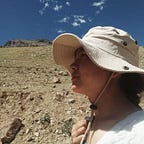Spiti Folksong Project: Ne Dang Phungma
I have grown up admiring my grandmother’s rich repertoire of cultural folk songs. She knows a song for every occasion and for every element of nature be it the sun, moon, wind, water or the fields. With every ounce of time, I get to spend with her during my breaks, I have learnt a lot listening to the meanings of her repository of songs. These are limited to not just the melody or the diverse songs she knows but also how all of it resemble the interconnectedness of nature and its elements with the way we live our everyday here in Spiti; how all of it shows the oneness of human beings and their agrarian life with nature; how the Spitian way of sustenance, survival and culture is very linked with the elements of nature be it in our songs, proverbs or beliefs.
This particular song (‘Oong Lu’) I have noted down below (with the help of my grandmother) is sung during the winnowing period as we lift the tsar through a pile of unhusked barley to separate the stalk and the grains. After a long 3–4 months of tending to the fields, the harvested barley bundles are trampled by animals in the ‘ooltak’. ‘Oong’ when translated from our local dialect means the barley grain that is separated from its husk. This particular song is a request to the local deities residing in the mountains in different directions to bring their eminent presence today for this winnowing; to strengthen the forces of wind so as to make the winnowing process easier and efficient; to bless the people with grains as bountiful as the frozen ice of the mighty glaciers and the glistening and overflowing water of the oceans.
“Oong Lu”
Shar Dorje ri kyi Khandoma
Dering diru oong la kyot
Ooltak Tashi gomaru, ngonmu du chhar jik sal
Lo Buddha ri kyi khandoma
Dering diru oong la kyot
Ooltak Tashi gomaru, ngonmu du chhar jik sal
Nub Buddha ri kyi khandoma
Dering diru oong la kyot
Ooltak Tashi gomaru, ngonmu du chhar jik sal
Chhan lechen ri kyi khandoma
Dering diru oong la kyot
Ooltak Tashi gomaru, ngonmu du chhar jik sal
Lachen Seblha oong la kyot
Ooltak Tashi gomaru, ngonmu du chhar jik sal
Ane Ghamen Gyalmo oong la kyot
Ooltak Tashi gomaru, ngonmu du chhar jik sal
Lalung Palkyi Gonpa na Oong kyi Angchuk Zambala
Dering diru oong la kyot
Luvu kyavrang luvu kyav
Luvu kyavla juglong met
Ne rang phungma bhetu kyot
Ne dang phungma bheta la
Lu meti metav met
Khimser luvi bhang chik sal
Gyari thuktop dirva khyen
Dering diru oong la kyot
Ghang kar tiksey tsamchik kya buru ru
Tsomo mawang tsamchik muk khili li
Now with the reach of modern technology and more easier methods of harvesting and threshing, the traditional method of winnowing is losing its existence in most villages of Spiti. With this, these old-age folk songs will also be wiped away as now the separation of grains from husks will be followed by the din of the thresher machine rather than these melodies. I am not anti-technology and against ways of living that save the time, energy and respect the circle of nature.
One has to adjust to the pace of change. But if we can find a middle ground, acknowledge our oneness with nature despite the loss of these songs and the amalgamation of technology in our lives, we will not lose who our ancestors were ages ago and the values they lived by. We will not lose who we once were.
